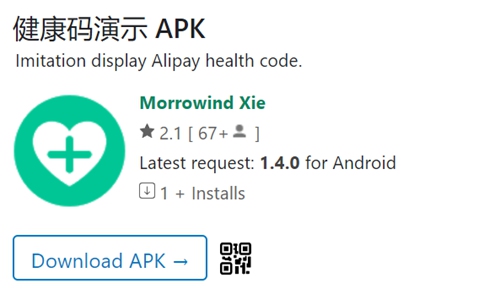Google blamed for helping distribute an app that could potentially disrupt China's anti-epidemic effort

A screeshot of Health Code Display app
An app within the Google Play store that could allow users to simulate different displays of China's health codes sparked social media uproar, as the app could potentially provide fake green code for people from medium-risk and high-risk areas and thus disrupt China's anti-epidemic effort at a time when a number of cities have reported a new wave of coronavirus outbreak.The app has been removed from Google's app store as of press time, after Chinese netizens said on China's twitter like Weibo that they will report the case to public security bureau and the National Health Commission.
Legal experts and industry observers said such move may have constituted a crime of damaging epidemic prevention and the app developer should be subject to legal responsibility. They also warned that Google could also hold joint liability for not examining the app carefully before distributing and the US firm needs to ban such app permanently as a remedy measure.
The public security bureau in Hangzhou, capital of East China's Zhejiang Province, has involved in an investigation against the app, the Beijing Toutiao reported on Tuesday.
The app, named Health Code Display, could simulate different display 'status modes' for health codes across different regions in China, according to its app description. It is able to customize display data, such as name, area and city, while also being able to show the status of green code, yellow code, orange code and red code.
The app was developed by a person named Morrowind Xie, who is reportedly based in Hangzhou, and was last updated on April 29, 2020. According to information on Android Package Kit (APK), Google's package file format for Android operating system, the app has been downloaded 1,000 times and received a score of 2.1 points out of 5.
The app comes with an accompanying notice in its description, which noted that the QR code is not actual health code and the app is only for demonstration purpose. According to the notice, the app could not be scanned by authorities, in which users' contact information is also registered upon entering a building.
Both the app developer and Google have not responded to the interview request of the Global Times as of press time.
Observers said that the app poses a potential threat to China's anti-epidemic management system, in which health codes have played a pivotal role in preventing COVID-19 from spreading and work resumption.
"The technology involved in developing the app is extremely basic but its social impact is very serious. It could fake green health code, helping people from medium- and high-risk areas to travel to other destinations and to other cities, as some frontline employees may not have enough time to check the health code throughout," Xiang Ligang, director-general of the Beijing-based Information Consumption Alliance, told the Global Times on Tuesday.
Xiang added that the app has created a loophole that may help users evade the anti-epidemic management, therefore damaging the country's top-down prevention mechanisms.
The app has led to widespread anger on China' social media beginning on Monday night, with some criticizing the app "making fun of a serious issue," and calling for authorities to investigate. Others also question why Google would allow such a "harmful" app to be distributed at its app store.
A legal expert, who prefers not to be identified, told the Global Times that the app developer should take legal responsibility for "compromising epidemic prevention," which could potentially carry a prison sentence if found guilty.
Liu Dingding, a Beijing-based internet market observer, told the Global Times on Tuesday that Google also holds a joint responsibility for not providing enough examination and supervision for such a blatantly illegal app.
"Google needs to remove all apps that negatively impact epidemic prevention as soon as possible and ban them permanently," Liu noted.


